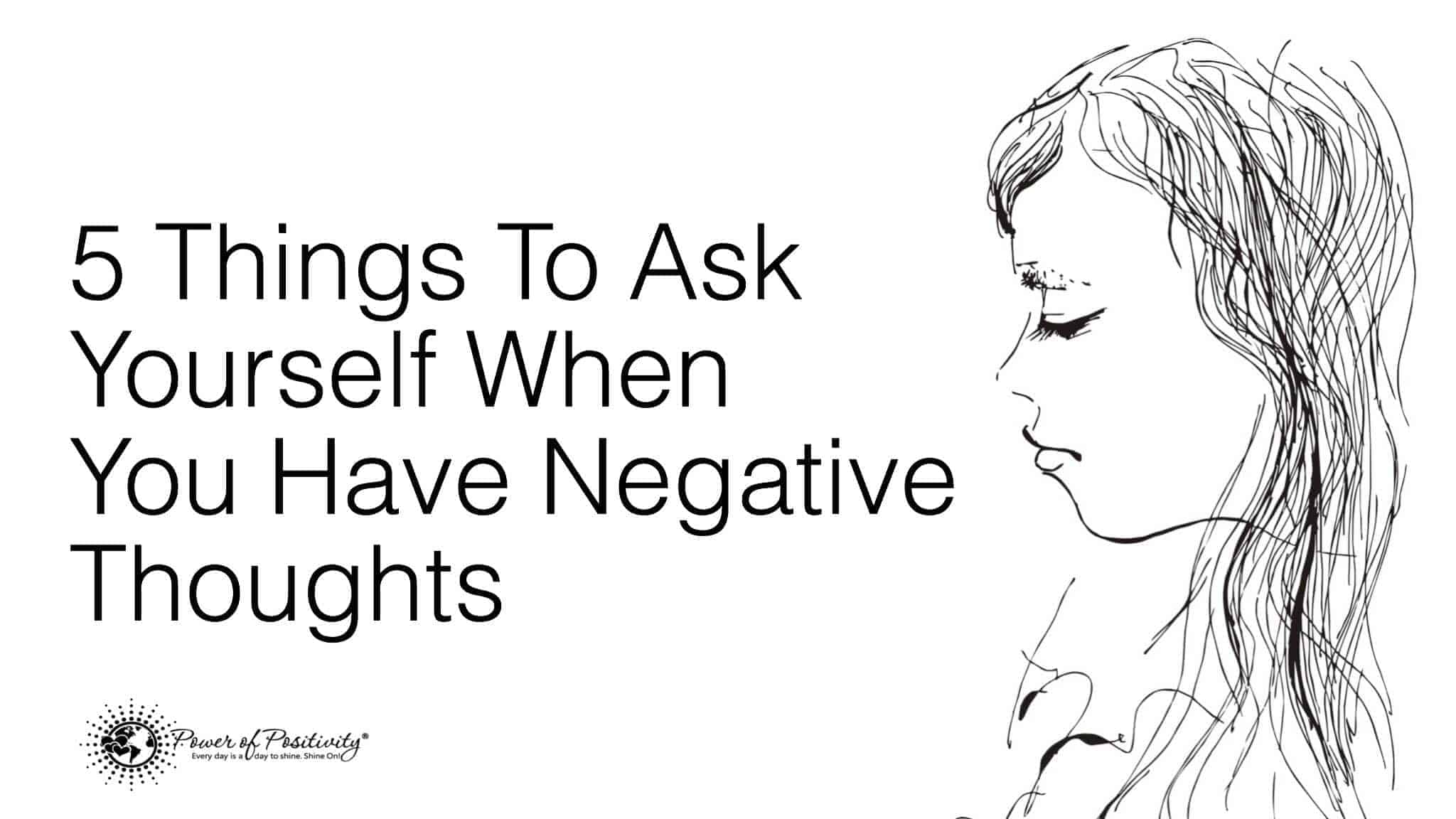Everybody deals with negative thoughts once in a while. They pop into your mind at the most inopportune moments. It’s easy to give them too much power. They can affect the way you feel about yourself and others. You may wonder what to do when you have negative thoughts.
Here are five things to ask yourself to help you deal with your negative thoughts.
1 – Is this negative thought an opinion or a fact?
It’s easy to confuse a fact with an opinion. There can be fewer facts than your opinions about yourself or someone else in life. These opinions come from your beliefs or your experiences, so they are more subjective rather than objective. What’s the difference between a fact and an opinion?
- Fact: Facts are statements supported by evidence. Someone can verify a fact.
- Opinion: This is a statement that someone issues based on beliefs or feelings without having evidence to support the claim.
When you realize that your negative thoughts about someone are based on your opinion rather than a fact, it can help you change your negative thoughts about them.
2 – What is the worst thing that could happen?
When you have negative thoughts, it’s tempting to let your thoughts go off in many directions. If you’re struggling with negative thoughts and the what-ifs that could happen, take a break. Step back and ask yourself some questions, such as these:
- What is the worst thing that could happen if these negative thoughts are true?
- Is someone at risk of being hurt or harmed in some way?
- Am I at risk of harm?
- What am I afraid of?
Usually, when you take the time to ask yourself these questions, you’ll realize that you have given in to fear based on your negative thoughts. The reality of the worst thing isn’t as real as you thought it could be.
3 – Are these negative thoughts helping me or hurting me?
Most of the time, your negative thoughts aren’t helpful or productive. They’re usually unrealistic and produce fear. Your negative thoughts create negative feelings. These feelings or emotions affect your brain region called the amygdala. This part of your brain sets off anxiety and stressful reactions. When you’re struggling with negativity, the amygdala will be slower to recover from stress and anxiety compared to someone more positive.
Stress affects your health. It can cause conditions like these:
- High blood pressure
- Heart problems
- Immune system problems that make you susceptible to disease
- Memory problems
- Stomach problems like IBS
- Insomnia
- Depression
Having a positive outlook doesn’t mean you never have negative thoughts or feelings, but when you have negative thoughts, you can let go of them. They should be short-term rather than a consistent experience for you. If you constantly overthink and worry about things that happened or what will happen in the future, you disconnect from the present-day reality. The key is being able to bounce back from your negative thoughts. This awareness is a sign of resilience.
4 – Is there any truth to these negative thoughts?
Sometimes you have nagging negative thoughts because you’ve done something you regret. What should you do with your feelings of regret? Here are some steps you can take to realize there is some truth to your negative thoughts.
- Take responsibility for what you did: Perhaps in a moment of anxiety, you yelled at your neighbor. Everybody says or does things they later regret. You can’t take back what you said, but you can accept the full reality of what you did. Taking responsibility is the best way to acknowledge the truth. It keeps you from falling prey to feeling like you’re a victim or feeling sorry for yourself, which won’t be helpful.
- Forgive and forget: Once you accept responsibility for what you did, you can forgive yourself. Don’t beat yourself up. Some people like to confess their wrongdoings to God to find peace. They find relief and a sense of calm when they do this.
- Make amends: If possible, it’s a good idea to make amends with the person you wronged. Apologize to the person you wronged with a sincere heart. Do what you can to repair the relationship. It depends on the level of friendship you have with the person. To apologize to your neighbor, you may say something like, “Hey, I apologize for what I said yesterday. It was wrong to yell at you. It can get tricky with some people who aren’t used to having anyone ask them for forgiveness. They may have grown up in a family where apologies weren’t given to one another. Or your neighbor may never forgive you and stop talking to you. Apologizing is a risk worth taking. At least you’ll have peace knowing you tried to apologize to them.
5 – What can you do to turn these negative thoughts into positive thoughts?
If possible, look for ways to turn your negative thoughts around to more positive thoughts. Here are things you can do.
- Remember gratitude: Write down the things you’re grateful for. Start with your family, friends, co-workers, or neighbors. Then move to the basics like food, clothing, a place to live, furniture to sit on. As your list grows, you’ll see how blessed you are. Things may not be perfect, but you have a lot to be grateful for.
- Take care of yourself: Be sure you’re eating nutritious foods, staying active, and getting enough sleep.
- Get engaged socially: Make time to hang out with friends. Having a community helps fight loneliness and feelings of isolation, leading to pessimistic thoughts. Here are some suggestions for staying engaged socially.
- Find an activity you enjoy, like an exercise class or a book club, to meet new people.
- Volunteer. It is a great way to stay engaged with other people.
- Arrange for a group of friends to have weekly meals together
- Start a new hobby. Have you always wanted to knit or paint? Maybe it’s time to sign up for a knitting or painting class with a friend. If you take a class, you’ll meet people.
- Join a church. Find a faith community where you can grow your faith in God and meet like-minded people.
- Focus on today: Assess how you’re feeling today. If you’re struggling with negative thoughts, remember, you won’t have these thoughts forever. Some days are just harder than others.
- Talk to a trusted friend: Talk to a close, trusted friend who will help you gain perspective. Be sure it’s someone you feel comfortable with and who knows you well enough to listen with compassion. A good friend loves you enough to point you in the right direction without judgment.
What causes negative thoughts?
If you’re human, you’re going to have negative thoughts once in a while. It’s a common problem. But there are some situations when you’re more prone to negativity.
- Depression
- Sleep-deprived
- Sickness
- Stress or anxiety
- Allergies
- Difficult life events
- Side effects from medications
If you notice yourself feeling irritable and having constant negative thoughts, it may be good to discuss this with your doctor. They can run blood tests to eliminate signs of disease or conditions that may cause you to feel this way. If you’re struggling with depression, see a counselor have someone to talk to about your thoughts.
Final thoughts on eliminating negative thoughts from your brain
Negative thoughts are familiar to everyone. If you’re human, you’re going to struggle with negative thoughts once in a while. They show up at the most unexpected times and can make you feel sad or discouraged. It’s vital to assess whether these thoughts about yourself or someone else are facts or opinions. Facts can be proven, while opinions are how you feel about something. You can’t prove opinions. Looking at the worst-case scenario is sometimes a helpful way to deal with negative thoughts that make you fearful. Seeing the underbelly of your negative thoughts takes away their scariness.
You may wrestle with negative thoughts when you’re having a hard day, feeling tired, or stressed. Plus, certain medical conditions can make you more susceptible to negative thoughts. You may wonder what you can do when you have these thoughts. Hopefully, these five questions to ask yourself will help you deal with your negative thoughts and replace them with more positive thoughts.


















